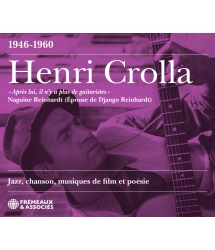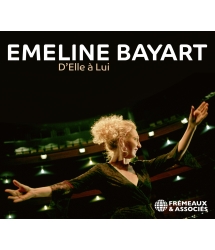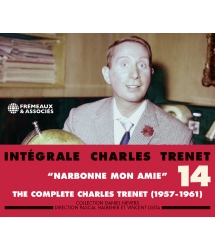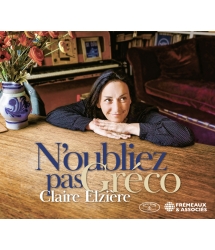- Our Catalog
- Philosophy
- Philosophers of the 20th century and today
- History of Philosophy (PUF)
- Counter-History and Brief Encyclopedia by Michel Onfray
- The philosophical work explained by Luc Ferry
- Ancient thought
- Thinkers of yesterday as seen by the philosophers of today
- Historical philosophical texts interpreted by great actors
- History
- Books (in French)
- Social science
- Historical words
- Audiobooks & Literature
- Our Catalog
- Jazz
- Blues
- Rock - Country - Cajun
- French song
- World music
- Africa
- France
- Québec / Canada
- Hawaï
- West Indies
- Caribbean
- Cuba & Afro-cubain
- Mexico
- South America
- Tango
- Brazil
- Tzigane / Gypsy
- Fado / Portugal
- Flamenco / Spain
- Yiddish / Israel
- China
- Tibet / Nepal
- Asia
- Indian Ocean / Madagascar
- Japan
- Indonesia
- Oceania
- India
- Bangladesh
- USSR / Communist songs
- World music / Miscellaneous
- Classical music
- Composers - Movie Soundtracks
- Sounds of nature
- Our Catalog
- Youth
- Philosophy
- News
- How to order ?
- Receive the catalog
- Manifesto
- Dictionnary











- Our Catalog
- Philosophy
- Philosophers of the 20th century and today
- History of Philosophy (PUF)
- Counter-History and Brief Encyclopedia by Michel Onfray
- The philosophical work explained by Luc Ferry
- Ancient thought
- Thinkers of yesterday as seen by the philosophers of today
- Historical philosophical texts interpreted by great actors
- History
- Books (in French)
- Social science
- Historical words
- Audiobooks & Literature
- Our Catalog
- Jazz
- Blues
- Rock - Country - Cajun
- French song
- World music
- Africa
- France
- Québec / Canada
- Hawaï
- West Indies
- Caribbean
- Cuba & Afro-cubain
- Mexico
- South America
- Tango
- Brazil
- Tzigane / Gypsy
- Fado / Portugal
- Flamenco / Spain
- Yiddish / Israel
- China
- Tibet / Nepal
- Asia
- Indian Ocean / Madagascar
- Japan
- Indonesia
- Oceania
- India
- Bangladesh
- USSR / Communist songs
- World music / Miscellaneous
- Classical music
- Composers - Movie Soundtracks
- Sounds of nature
- Our Catalog
- Youth
- Philosophy
- News
- How to order ?
- Receive the catalog
- Manifesto
- Dictionnary
1958-1962
EDITH PIAF
Ref.: FA5617
Label : Frémeaux & Associés
Total duration of the pack : 2 hours 5 minutes
Nbre. CD : 2
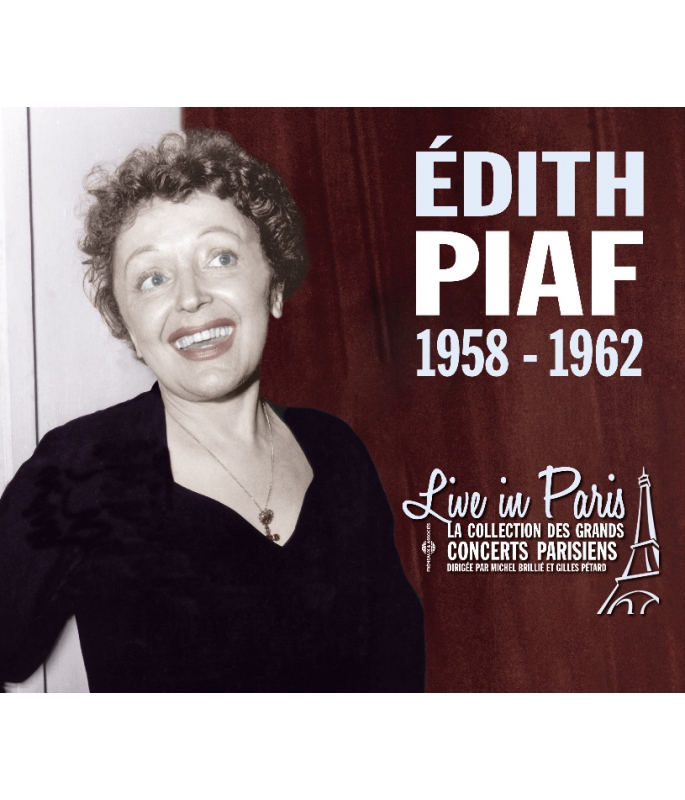
1958-1962
Édith Piaf is the most fascinating French singer. Her songs have circled the globe and today they belong to our worldheritage. This set contains the most beautiful versions of her greatest hits, recorded live in Paris between 1958 and 1962. The set contains historic period-documents (audio conversations with Jean Cocteau, Joseph Kessel or Pierre Brasseur, or in duo with Jacques Prévert, etc.). A booklet written by Martin Pénet, a great Piaf specialist and French song-historian, accompanies the contents. Patrick FRÉMEAUX
The Live in Paris collection by Michel Brillié allows listeners to hear previously-unreleased recordings (made at concerts and private- or radio-sessions) by the great 20th stars in jazz, rock & roll and song. These “live” takes, and the artists’ rapport with their audiences, gives these performances an additional soul and sensibility in counterpoint to the rigorous demands of studio recordings. Particular care was taken when restoring the sound of these tapes in order to meet CD standards while preserving the original colours of the period. Patrick FRÉMEAUX & Gilles PÉTARD
DIRECTION ARTISTIQUE : GILLES PÉTARD ET MICHEL BRILLIÉ
DROITS : BODY & SOUL / DP
COMMERCIALISATION : FREMEAUX & ASSOCIES.
CD 1 :
COMME MOI • LA FOULE • LES GROGNARDS • MON MANÈGE À MOI • C’EST À HAMBOURG • BRAVO POUR LE CLOWN • HYMNE À L’AMOUR • L’HOMME À LA MOTO • ROULEZ TAMBOURS • LE DIABLE DE LA BASTILLE • SALE PETIT BROUILLARD • LE BILLARD ÉLECTRIQUE • TOI TU L’ENTENDS PAS • A QUOI ÇA SERT L’AMOUR • MILORD.
CD 2 :
JEAN COCTEAU PRÉSENTE ÉDITH PIAF (EXTRAIT DU «BEL INDIFFÉRENT») • TANT QU’IL Y AURA DES JOURS / LE DÉNICHEUR (LIVE 8 MARS 1961) • J’N’ATTENDS PLUS RIEN / LES NUITS (LIVE 8 MARS 1961) • ÉDITH PIAF SUR « UN JEUNE HOMME CHANTAIT » • UN JEUNE HOMME CHANTAIT • ÉDITH PIAF ÉVOQUE JACQUES PRÉVERT • QUAND TU DORS (LIVE 21 DÉCEMBRE 1960) • EMBRASSE-MOI (LIVE 21 DÉCEMBRE 1960) • ÉDITH PIAF ET JACQUES PRÉVERT SUR « LES FEUILLES MORTES » • L’ÉTRANGER (LIVE 8 FÉVRIER 1961) • ÉDITH PIAF SUR LES COMPAGNONS DE LA CHANSON • LES TROIS CLOCHES (LIVE 1ER MARS 1961) • DONNE DU RHUM / JEAN L’ESPAGNOL / T’ES BEAU TU SAIS / MILORD AVEC GEORGES MOUSTAKI (LIVE 3 SEPTEMBRE 1958) • JOSEPH KESSEL SUR ÉDITH PIAF AU GALA DE LA TOUR EIFFEL • LE DROIT D’AIMER (LIVE 25 SEPTEMBRE 1962) • LES MOTS D’AMOUR (LIVE 18 JANVIER 1961) • ÉDITH PIAF ET MICHEL RIVGAUCHE SUR «LA FOULE» ET «LE KIOSQUE À JOURNAUX» • NON, JE NE REGRETTE RIEN (LIVE 23 NOVEMBRE 1960) • ÉDITH PIAF SUR CHARLES DUMONT • LA FILLE QUI PLEURAIT DANS LA RUE AVEC CHARLES DUMONT • ÉDITH PIAF ET CHARLES DUMONT SUR « NON, JE NE REGRETTE RIEN » • LES AMANTS AVEC CHARLES DUMONT (LIVE 22 MARS 1961) • NEIN, DREIMAL NEIN, ALLES MÜSS SO SEIN (LIVE 15 MAS 1961) • ÉDITH PIAF ET PIERRE BRASSEUR • LA VILLE INCONNUE (LIVE 18 JANVIER 1961) • PIERRE BRASSEUR LIT UNE LETTRE À ÉDITH PIAF SUR «MON MANÈGE À MOI».
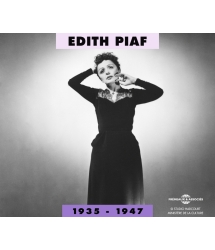
Enregistrements originaux 1935-1947
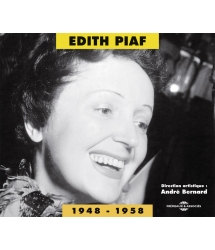
1948-1958
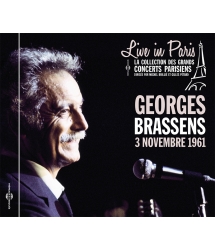
LIVE IN PARIS (3 NOVEMBRE 1961)
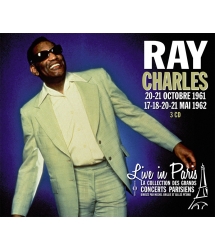
20-21 OF OCTOBER 1961 / 17-18-20-21 OF MAY 1962




-
PisteTitleMain artistAutorDurationRegistered in
-
1Comme MoiEdith Piaf, Robert ChauvignyEdith Delecluse00:02:461958
-
2La FouleEdith Piaf, Robert ChauvignyE. Dizeo00:03:001958
-
3Les GrognardsEdith Piaf, Robert ChauvignyPierre Delanoe00:04:021958
-
4Mon manège à moiEdith Piaf, Robert ChauvignyJean Constantin00:03:081958
-
5C'est à HambourgEdith Piaf, Robert ChauvignyEdith Delecluse00:03:301958
-
6Bravo pour le clownEdith Piaf, Robert ChauvignyHenri Contet00:03:041958
-
7Hymne à l'amourEdith Piaf, Robert ChauvignyEdith Piaf00:03:401958
-
8L'Homme à la motoEdith Piaf, Robert ChauvignyJerry Leiber00:03:401958
-
9Roulez TamboursEdith Piaf, Jean LecciaEdith Piaf00:04:011962
-
10Le diable de La BastilleEdith Piaf, Jean LecciaPierre Delanoe00:02:431962
-
11Sale petit brouillardEdith Piaf, Jean LecciaJacques Plante00:03:011962
-
12Le billard électriqueEdith Piaf, Jean LecciaLouis Poterat00:03:131962
-
13Toi tu l'entends pasEdith Piaf, Jean LecciaPierre Delanoe00:02:461962
-
14A quoi ça sert l'amourEdith Piaf, Jean LecciaMichel Emer00:02:431962
-
15MilordEdith Piaf, Jean LecciaG. Moustaki00:04:501962
-
PisteTitleMain artistAutorDurationRegistered in
-
1Jean Cocteau présente Edith Piaf (Extrait du Bel Indifferent)Jean CocteauJean Cocteau00:03:081946
-
2Tant qu'il y aura des jours - Le dénicheurEdith PiafMichel Rivgauche00:02:351961
-
3J'n'attends plus rien: Les nuitsEdith PiafMarie Malleville00:03:211961
-
4Edith Piaf sur « Un jeune homme chantait »Edith PiafEdith Piaf00:01:051961
-
5Un jeune homme chantaitEdith PiafRaymond Asso00:03:041960
-
6Edith Piaf évoque Jacques PrévertEdith PiafEdith Piaf00:00:371960
-
7Quand tu dorsEdith PiafJacques Prévert00:02:381960
-
8Embrasse-moiEdith PiafJacques Prévert00:02:471960
-
9Edith Piaf et Jacques Prévert sur « Les Feuilles mortes »Edith PiafJacques Prévert00:00:471960
-
10L'EtrangerEdith PiafRobert Malleron00:03:301961
-
11Edith Piaf sur Les Compagnons de la chansonEdith PiafEdith Piaf00:02:051961
-
12Les Trois clochesEdith PiafJean Villard00:03:501961
-
13Donne du rhum/Jean l'Espagnol/T'es Beau tu sais/MilordEdith PiafGeorges Moustaki00:05:441958
-
14Joseph Kessel sur Edith Piaf, au gala de la Tour EiffelJoseph KesselJoseph Kessel00:03:221962
-
15Le droit d'aimerEdith PiafRobert Nyel00:03:371962
-
16Les mots d'amourEdith PiafMichel Rivgauche00:03:161961
-
17Edith Piaf et Michel Rivgauche sur «La Foule» et «Le Kiosque»Edith PiafMichel Rivgauche00:04:031960
-
18Non, je ne regrette rienEdith PiafMichel Vaucaire00:02:341960
-
19Edith Piaf sur Charles DumontEdith PiafEdith Piaf00:01:251961
-
20La fille qui pleurait dans la rueCharles DumontEdith Piaf00:03:211961
-
21Edith Piaf et Charles Dumont sur « Non, je ne regrette rien »Edith Piaf, Charles DumontEdith Piaf00:03:041961
-
22Les amantsCharles DumontEdith Piaf00:04:081961
-
23Nein dreimal nein alles muss so seinEdith PiafMichel Vaucaire00:02:441961
-
24Edith Piaf et Pierre BrasseurEdith Piaf, Pierre BrasseurEdith Piaf00:00:471961
-
25La ville inconnueEdith PiafMichel Vaucaire00:02:581961
-
26Pierre Brasseur lit une lettre à Edith Piaf sur «Mon Manège»Pierre BrasseurPierre Brasseur00:05:191961
Piaf Live in Paris FA5617
ÉDITH PIAF
Live in Paris
1958 - 1962
La collection des grands concerts parisiens
Dirigée par Michel Brillié et Gilles Pétard
Édith Piaf est devenue un mythe international et a fini par occulter la plupart des autres chanteuses françaises de son temps. S’il y a évidemment une part d’injustice dans ce phénomène, il y a aussi des raisons qui tiennent à la fois à sa façon d’occuper les médias, à sa personnalité hors du commun et bien sûr à son talent exceptionnel. Sa vie semblait se jouer sur scène car elle chantait avec une sincérité qui ne trompe pas. Les interprétations en public constituent donc un témoignage irremplaçable de son art. Pourtant, en cette époque où les artistes tournaient énormément, tant à Paris qu’en province ou à l’étranger, leurs prestations scéniques étaient rarement enregistrées.
À partir de 1957, la jeune station de radio Europe 1 s’est associée à Bruno Coquatrix, directeur de l’Olympia, pour diffuser des concerts en direct ou en différé dans le cadre de l’émission « Musicorama ». Ces captations – différentes de celles effectuées lors des mêmes séries de concerts pour les disques Pathé-Marconi – complètent la perception que l’on peut avoir des performances de Piaf. Le premier CD de ce coffret contient de belles séquences enregistrées à l’Olympia le 20 mars 1958 et le 10 octobre 1962. Dans la seconde figure A quoi ça sert l’amour ? en duo avec Théo Sarapo, le tout nouveau mari d’Édith (elle l’avait épousé la veille) qui faisait de timides débuts sur scène tout en gravant ses premiers disques.
Piaf aimait aussi se raconter au micro et dans la presse, de façon plus ou moins véridique, afin de consolider le roman de sa légende. Elle se laissait volontiers convier aux émissions radio ou télé, de sorte qu’il existe beaucoup d’archives conservant sa voix parlée. Certaines paraissent pourtant moins connues que d’autres. Le second CD de ce coffret propose des extraits de la série d’entretiens qu’elle a donnés à Europe 1 pour l’émission « Édith Piaf et ses amis ». Ils ont été enregistrés à Paris, entre fin 1960 et début 1961, en son domicile du boulevard Lannes et dans les studios de la radio rue François Ier. Durant plusieurs semaines, des personnalités du monde des arts et du spectacle sont venues s’entretenir avec la chanteuse, échanger anecdotes et souvenirs. La présente sélection propose les séquences les plus intéressantes de cette série ; en particulier les chansons qu’elle offrait ainsi aux auditeurs, de façon spontanée, avec une déconcertante facilité et une rare présence.
Bien que son corps soit marqué par les épreuves, les drogues et l’abus de médicaments, Édith est alors au sommet de son art. Comme si, à l’instar des plus grandes chanteuses de blues, un destin fatal magnifiait l’expression artistique et donnait à la voix une résonance particulière. On peut imaginer des parallèles, mais il n’est pas question ici de retracer le parcours de Bessie Smith, de Billie Holiday, ou par la suite celui de Judy Garland, Janis Joplin, Amy Winehouse.
L’automne 1960, c’est le moment où Piaf, qui va fêter ses 45 ans, prépare une rentrée à l’Olympia perçue par beaucoup comme suicidaire. Elle renouvelle presque tout son répertoire, avec des chansons signées Michel Vaucaire et Charles Dumont : Mon Dieu, Les flon-flons du bal… et surtout Non, je ne regrette rien. Le résultat est au-delà de toute espérance, car ses quatre mois consécutifs de présence sur scène marqueront de façon indélébile la mémoire des spectateurs et l’histoire de l’établissement.
C’est donc une chance pour nous de pouvoir entendre des enregistrements privés réalisés au même moment dans l’intimité de ses souvenirs, en compagnie de ses amis et de ses collaborateurs les plus proches. Autant dire qu’il s’agit le plus souvent des mêmes personnes, tant Piaf avait l’art de mélanger son métier et sa vie privée en un tourbillon permanent où le rire avait bien plus souvent sa place que les larmes Se succèdent ainsi sa fidèle compositrice Marguerite Monnot ; de nouveaux auteurs et compositeurs comme Michel Rivgauche, Georges Moustaki, Charles Dumont ; des poètes qu’elle a interprétés, aussi différents que Jean Cocteau ou Jacques Prévert ; le comédien Pierre Brasseur.
On peut également signaler qu’à la même époque, Europe 1 organisa boulevard Lannes une belle rencontre radiophonique entre Piaf et Marie Dubas : la créatrice en 1936 de Mon légionnaire, a été, selon les propres mots d’Édith, son admiration absolue et sa référence dans l’art du tour de chant.
Les pages les moins attendues de la série « Édith Piaf et ses amis » sont celles de l’évocation de ses débuts difficiles, lorsqu’elle chantait dans les rues avec un porte-voix, avant de commencer, fin 1935, sa carrière de chanteuse au cabaret et au music-hall. Son répertoire était alors composé de succès créés par d’autres entre 1910 et 1935 : Le Dénicheur, Les nuits, J’n’attends plus rien, etc. Des rengaines que l’on connait plus ou moins par le souvenir des chanteuses réalistes ou de musette, mais qui prennent une dimension inusitée dès lors qu’elles sont chantées par Piaf.
Il est aussi touchant de l’entendre converser avec ceux qui ont signé ses récents succès, pour en raconter la genèse et en livrer des versions inédites au micro. Enfin, on mesure le rayonnement international qu’elle a su obtenir de son vivant avec l’appui de son impresario Louis Barrier en sillonnant les Amériques, l’Europe occidentale, le Maghreb et le Proche-Orient. En dehors du français, elle n’a enregistré qu’une dizaine de titres en anglais ; et l’on découvre avec surprise qu’elle aurait pu le faire également en allemand, alors qu’elle a laissé à Dalida la possibilité d’atteindre des records de ventes avec l’adaptation allemande de Milord.
Le 25 septembre 1962, une série d’événements est organisée autour de la Tour Eiffel à l’occasion du lancement par la 20th Century Fox du film Le jour le plus long de Darryl Zannuck. Une foule de 50 000 personnes massée au pied du Trocadéro jusqu’aux rives de la Seine assiste aux festivités qui se termineront par un feu d’artifice. Une scène sonorisée a été aménagée au premier étage de la tour pour Édith Piaf, invitée de prestige de cette journée. Présentée par Joseph Kessel et accompagnée par l’orchestre de Jean Leccia, elle chante Le droit d’aimer et Non, je ne regrette rien.
On croit tout savoir sur Piaf, et on se rend compte qu’il restera toujours quelque chose à découvrir. Cela explique sans doute le nombre impressionnant de biographies et de rééditions audio/visuelles qui sont publiées à travers le monde à chaque anniversaire de sa naissance ou de sa disparition. Un mythe a besoin d’ingrédients pour s’entretenir, mais dans le cas d’Édith, il suffit de peu de chose pour le réactiver : l’émotion est à portée d’oreille.
Martin Pénet
Spécialiste de la chanson française, Martin Pénet est journaliste, producteur (France Musique, France Culture) et historien. Il est l’auteur de plusieurs ouvrages et a réalisé de nombreuses anthologies patrimoniales en CD, dont l’intégrale Marie Dubas (FA053) avec François Bellair chez Frémeaux & Associés.
© FRÉMEAUX & ASSOCIÉS 2015
Édith Piaf
Live in Paris 1958-1962
Édith Piaf became an international legend while eclipsing most other French singers of her time. The phenomenon has its share of unfairness but there were also reasons due to the space she occupied in the media, her uncommon personality and, of course, her exceptional talent. Her life seemed to play out onstage, for she sang with unfailing sincerity; and so her public performances provide irreplaceable evidence of her artistry. Yet at a time when artists toured extensively (either in Paris, the provinces or abroad), performances by the latter were rarely recorded.
Beginning in 1957, the recently founded Europe 1 radio station joined with Bruno Coquatrix, the director of the Olympia theatre, to broadcast concerts (either “live” or at a later time) in a programme to which they gave the name “Musicorama”. Those “aircasts” — they are different from the takes recorded during the same series of concerts for the record-company Pathé-Marconi — complete our perception of Piaf’s performances. The first CD in the present set contains some beautiful sequences recorded at the Olympia on March 20th 1958 and October 10th 1962. On the second CD there is A quoi ça sert l’amour ?, a duet with Théo Sarapo, Édith’s brand-new husband (it was the day after their wedding!) who was making his timid stage-debut at the same time as he was making his first records.
Piaf was also very fond of talking about herself, both in print and in front of a microphone (more or less telling the truth); it gave substance to the novel of her own legend. She easily allowed herself to be invited to take part in radio or television shows, and there are many archives available where her spoken voice has been preserved. Some are less well known than others, however, and the second disc in this set contains excerpts from the series of interviews she gave to Europe 1 for the programme “Édith Piaf et ses amis.” These were recorded between the end of 1960 and early 1961 at her home on the boulevard Lannes in Paris or in the station’s studios rue François Ier. Over several weeks, personalities from the worlds of entertainment and the arts came in for conversations with the singer and exchange memories and stories. This selection contains the most interesting episodes from that “Piaf and friends” series, together with the songs she sang for listeners (quite spontaneously). The ease with which she does so is quite disconcerting, and she shows a rare presence.
At this time in her life, despite the fact that she was physically marked by life’s trials and the abuse of different drugs and medicines, Édith was at the summit of her artistry. It was as if, like the greatest blues singers, a fatal destiny had magnified her artistic expression and given a particular resonance to her voice. Drawing such a parallel is unavoidable, even if there’s no question here of exploring the lives of Bessie Smith or Billie Holiday, or later those of Judy Garland, Janis Joplin and Amy Winehouse.
Autumn 1960 was the period chosen by Piaf, on the eve of celebrating her 45th birthday, to prepare for her return to the Olympia for a season that was many people saw as a risk, if not suicidal. For one, she had almost completely renewed her repertoire, with songs from Michel Vaucaire and Charles Dumont: Mon Dieu, Les flon-flons du bal… and especially Non, je ne regrette rien. The result was successful beyond the wildest of dreams: her presence on the Olympia stage for four consecutive months would leave an indelible mark on her audiences (and on the history of this legendary venue.)
So we are very lucky to be able to hear private recordings made at the same moment in the intimacy of her memories and in the company of her closest friends and associates. Quite often the latter were one and the same, for Piaf made an art of mingling her professional and private lives in a whirlwind existence where laughter, finally, was more common than tears… There was her faithful composer Marguerite Monnot, for example; new writers and composers like Michel Rivgauche, Georges Moustaki and Charles Dumont; the poets whose works she sang, artists as different as Jean Cocteau or Jacques Prévert; not to mention actor Pierre Brasseur…
It is worth noting that, during the same period, also at her home on the boulevard Lannes Europe 1 organized a beautiful encounter between Piaf and Marie Dubas: the latter, who created Mon légionnaire in 1936, was in Édith’s own words, her “absolute admiration” and reference in the art of song.
The least-expected chapters in the series entitled “Édith Piaf et ses amis” were those evoking her difficult beginnings when she used to sing in the streets with a megaphone, before she began her career at the end of 1935 as a music-hall and cabaret-singer. Her repertoire then was composed of songs that others had turned into hits between 1910 and 1935: Le Dénicheur, Les nuits, J’n’attends plus rien, etc. They were now somewhat hackneyed, and known only to those who recalled the Realist and musette singers, but they took on an exceptional dimension when Piaf was singing them.
It’s also touching to hear her talking with those responsible for her latest hits: in conversation with their writers she reveals the genesis of these songs and also delivers versions of them behind a microphone for the very first time. And finally you can measure the extent of her popularity outside her native country: she was an international star in her lifetime, thanks to her impresario Louis Barrier, who negotiated tours for her across the Americas, the rest of Europe, North Africa and The Middle East. Singing almost exclusively in French, Piaf nonetheless recorded a dozen titles in English and, surprisingly, we also discover that she could have sung in German also, had she not left to Dalida the opportunity to reach huge sales with the German-language adaptation of Milord.
On September 25th 1962 a series of events took place around the Eiffel Tower at the launch of the 20th Century Fox film The Longest Day (directed by Darryl Zanuck). A crowd of some fifty thousand massed at the Trocadero on the banks of the River Seine to witness the festivities, which ended in a fireworks display. A stage was set up on the first floor of the Eiffel Tower for Édith Piaf, the day’s prestigious star guest. Introduced by Joseph Kessel and accompanied by the orchestra of Jean Leccia, Piaf sang Le droit d’aimer and Non, je ne regrette rien.
Just when people think they know all there is to know about Édith Piaf, they discover that something still remains… and this explains, no doubt, the impressive list of biographies published around the world, and the number of audio/visual documentaries released on the anniversaries of her birth and disappearance. A legend needs nourishment to be perpetuated, but in Édith’s case, little is need to reactivate the myth: the emotion, after all, remains within hearing distance.
Martin PÉNET
Adapted into English by Martin DAVIES
A specialist in French Song, Martin Pénet is a journalist, radio producer (France Musique, France Culture) and historian. He has written numerous works on the subject and compiled many anthologies dealing with France’s national heritage, among them the Complete Marie Dubas (FA053) with François Bellair for Frémeaux & Associés.
© FRÉMEAUX & ASSOCIÉS 2015
CD 1
1. Comme moi (Édith Delécluse, Michelle Senlis - Marguerite Monnot) 2’46
2. La foule (Enrique Dizeo / Michel Rivgauche - Angel Cabral) 3’00
3. Les grognards (Pierre Delanoë - Hubert Giraud) 4’02
4. Mon manège à moi (Jean Constantin - Norbert Glanzberg) 3’08
5. C’est à Hambourg (Édith Delécluse, Michelle Senlis - Marguerite Monnot) 3’30
6. Bravo pour le clown (Henri Contet - Louiguy) 3’04
7. Hymne à l’amour (Édith Piaf - Marguerite Monnot) 3’40
8. L’homme à la moto (Jerry Leiber & Mike Stoller / Jean Dréjac) 2’03
9. Roulez tambours (Édith Piaf - Francis Lai) 4’01
10. Le diable de la Bastille (Pierre Delanoë - Charles Dumont) 2’43
11. Sale petit brouillard (Jacques Plante - Francis Lai) 3’01
12. Le billard électrique (Louis Poterat - Charles Dumont) 3’13
13. Toi tu l’entends pas (Pierre Delanoë - Charles Dumont) 2’46
14. A quoi ça sert l’amour (Michel Emer) 2’43
15. Milord (Georges Moustaki - Marguerite Monnot) 4’50
Enregistré par le personnel d’Europe N°1
Dates d’enregistrement
Pistes 1 à 7 : 20 mars 1958
Piste 8 : septembre 1958
Pistes 9 à 15 : 10 octobre 1962
Lieu d’enregistrement
L’Olympia, Paris
Personnel
Pistes 1 à 8 : orchestre dirigé par Robert Chauvigny
Pistes 9 à 15 : orchestre dirigé par Jean Leccia
Produit par Bruno Coquatrix
CD 2
1. Jean Cocteau présente Édith Piaf (extrait du « Bel Indifférent ») 3’08
2. Tant qu’il y aura des jours / Le dénicheur (Live 8 mars 1961)
(Michel Rivgauche - Marguerite Monnot / Emile Gibert, Léon Agel - Léo Daniderff) 2’35
3. J’n’attends plus rien / Les nuits (Live 8 mars 1961)
(Marie Malleville - Lionel Cazaux, Pierre Guillermin / Denyse Luciani - Cloërec-Maupas) 3’21
4. Édith Piaf sur « Un jeune homme chantait » 1’05
5. Un jeune homme chantait (Live 28 décembre 1960) (Raymond Asso - Léo Poll) 3’04
6. Édith Piaf évoque Jacques Prévert 0’37
7. Quand tu dors (Live 21 décembre 1960) (Jacques Prévert - Christiane Verger) 2’38
8. Embrasse-moi (Live 21 décembre 1960) (Jacques Prévert - Wal-Berg) 2’47
9. Édith Piaf et Jacques Prévert sur « Les feuilles mortes » 0’47
10. L’étranger (Live 8 février 1961) (Robert Malleron - Marguerite Monnot, Robert Juel) 3’30
11. Édith Piaf sur Les Compagnons de la Chanson 2’05
12. Les trois cloches (Live 1er mars 1961) (Jean Villard) 3’50
13. Donne du rhum / Jean l’espagnol / T’es beau tu sais / Milord (avec Georges Moustaki)
(Live 3 septembre 1958) (Georges Moustaki / Georges Brunon - Georges Moustaki /
Henri Contet - Georges Moustaki / Georges Moustaki - Marguerite Monnot) 5’44
14. Joseph Kessel sur Édith Piaf au Gala de la Tour Eiffel 3’22
15. Le droit d’aimer (Live 25 septembre 1962) (Robert Nyel - Francis Lai) 3’37
16. Les mots d’amour (Live 18 janvier 1961) (Michel Rivgauche - Charles Dumont) 3’16
17. Édith Piaf et Michel Rivgauche sur « La foule » et « Le kiosque à journaux » 4’03
18. Non, je ne regrette rien (Live 23 novembre 1960) (Michel Vaucaire - Charles Dumont) 2’34
19. Édith Piaf sur Charles Dumont 1’25
20. La fille qui pleurait dans la rue (par Charles Dumont) (Édith Piaf - Charles Dumont) 3’21
21. Édith Piaf et Charles Dumont sur « Non, je ne regrette rien » 3’04
22. Les amants (par Charles Dumont) (Live 22 mars 1961) (Édith Piaf - Charles Dumont) 4’08
23. Nein, dreimal nein, alles müss so sein (Live 15 mars 1961)
(Michel Vaucaire - Charles Dumont) 2’44
24. Édith Piaf et Pierre Brasseur 0’47
25. La ville inconnue (Live 18 janvier 1961) (Michel Vaucaire - Charles Dumont) 2’58
26. Pierre Brasseur lit une lettre à Édith Piaf sur « Mon manège à moi »
(Jean Constantin - Norbert Glanzberg) 5’19
Enregistré et produit par l’équipe technique d’Europe N°1
Dates d’enregistrement
Piste 1 : 1946
Piste 2 : inconnu
Pistes 3 et 4 : 8 mars 1961
Piste 5 : 28 décembre 1960
Pistes 6 à 9 : 21 décembre 1960
Piste 10 : 8 février 1961
Pistes 11 et 12 : 1er mars 1961
Piste 13 : 3 septembre 1958
Pistes 14 et 15 : 25 septembre 1962
Piste 16 : 18 janvier 1961
Piste 17 : 19 octobre 1960
Piste 18 : 23 novembre 1960
Pistes 19 à 21 : 15 mars 1961
Piste 22 : 22 mars 1961
Piste 23 : 15 mars, 1961
Piste 24 : 15 juin 1961
Piste 25 : 18 janvier 1961
Piste 26 : 15 juin 1961
Lieux d’enregistrement
Piste 1 : inconnu
Pistes 2 à 10 : 67 boulevard Lannes, Paris XVIe, France
Pistes 11 et 12 : Studio Pyramides, Europe N°1, 26 bis, rue François Ier, Paris VIIIe, France
Piste 13 : Studio Jenner, Paris, France
Pistes 14 et 15 : Tour Eiffel, Paris, France
Pistes 16 à 26 : 67 boulevard Lannes, Paris XVIe, France
Dédié à Claude Boquet, Bill Dubois, Jean Claude, Philippe Moch et la bande
La collection Live in Paris :
Collection créée par Gilles Pétard pour Body & Soul et licenciée à Frémeaux & Associés
Direction artistique et discographie : Michel Brillié, Gilles Pétard
Coordination : Augustin Bondoux
Conception : Patrick Frémeaux, Claude Colombini
Fabrication et distribution : Frémeaux & Associés
Édith Piaf est la plus fascinante des chanteuses françaises. Ses chansons ont fait le tour du monde et font partie du patrimoine universel. Ce coffret présente les plus belles prises de son live de ses grands succès, enregistrées à Paris entre 1958 et 1962, et présente des documents audio d’époque (entretiens avec Jean Cocteau, Joseph Kessel ou Pierre Brasseur, duo avec Jacques Prévert, etc.) Le livret est rédigé par Martin Pénet, grand spécialiste et historien de la chanson française. Patrick FRÉMEAUX
Édith Piaf is the most fascinating French singer. Her songs have circled the globe and today they belong to our world-heritage. This set contains the most beautiful versions of her greatest hits, recorded live in Paris between 1958 and 1962. The set contains historic period-documents (audio conversations with Jean Cocteau, Joseph Kessel or Pierre Brasseur, or in duo with Jacques Prévert, etc.). A booklet written by Martin Pénet, a great Piaf specialist and French song-historian, accompanies the contents. P. FRÉMEAUX
La collection « Live in Paris », dirigée par Michel Brillié, permet de retrouver des enregistrements inédits (concerts, sessions privées ou radiophoniques), des grandes vedettes du jazz, du rock & roll et de la chanson du XXe siècle. Ces prises de son live et la relation avec le public apportent un supplément d’âme et une sensibilité en contrepoint à la rigueur appliquée lors des enregistrements studio. Une importance singulière a été apportée à la restauration sonore des bandes pour convenir aux standards CD tout en conservant la couleur d’époque. Patrick FRÉMEAUX & Gilles PÉTARD
The Live in Paris collection by Michel Brillié allows listeners to hear previously-unreleased recordings (made at concerts and private- or radio-sessions) by the great 20th stars in jazz, rock & roll and song. These “live” takes, and the artists’ rapport with their audiences, gives these performances an additional soul and sensibility in counterpoint to the rigorous demands of studio recordings. Particular care was taken when restoring the sound of these tapes in order to meet CD standards while preserving the original colours of the period. Patrick FRÉMEAUX & Gilles PÉTARD
